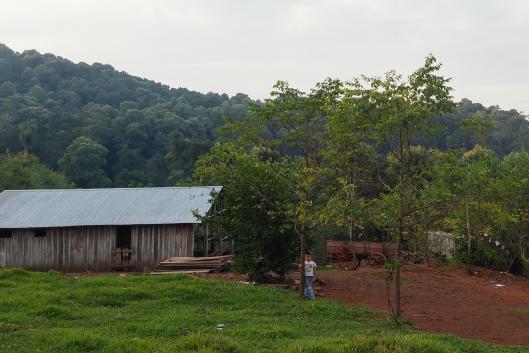While the destruction of forest territories continues, more pledges, agreements and programs are being implemented in the name of ‘addressing deforestation and climate change’. This bulletin highlights among others how deforestation is being hidden under ‘green’ discourses and flashy propaganda.
While forest-dependent communities around the world still confront the expanding threats and destruction of their territories, more pledges, agreements, projects and programs are being made and implemented in the name of ‘addressing deforestation and climate change’. Multinational corporations, governments, multilateral banks, United Nations (UN) agencies, conservation NGOs and their financial backers keep affirming that they –the same actors that in fact drive the direct and underlying causes of deforestation- can be ‘the solution.’
This bulletin compiles seven articles that show how deforestation processes are more often than not hidden under ‘green’ discourses and flashy propaganda. Some of the authors also remind us that forest communities - despite being criminalized and often conveniently blamed for deforestation and evicted from their territories - keep resisting this destruction and the false solutions imposed on them while being the stewardships of their forests, cultures and lives.
An article from Indonesia alerts that while the devastating impacts of the climate crisis are severely impacting thousands of fishing communities, an offset mechanism called ‘Blue Carbon’, promoted by the United Nations as a ‘solution’ to the crisis, is transforming coastal territories into tradable assets. While damage to mangroves results from hotels development, industrial shrimp farms, expansion of oil palm plantations and massive mining, Blue Carbon aims to greenwash the increasing and devastating destruction by these and other polluting actors.
From Mozambique, an article outlines the dangers of the growing conservation trust funds, such as the case of BIOFUND. This fund was created to finance the protected areas system of Mozambique, with support from the World Bank, international cooperation agencies and conservation NGOs. It aims to capture large contributions, including revenues generated from biodiversity offset projects in the country, and speculate with that money in financial markets.
Another article shows how despite the pledges from the government of Malaysia to maintain a 50 per cent forest cover in the country, at least 3.4 million hectares of mostly forested areas have been designated for the development of monoculture plantations since the 1990s, including timber and oil palm plantations. The 50 per cent ambition appears to rest on statistics that consider monoculture plantations as part of the national ‘forest cover’.
Another article exposes how the Green Climate Fund, which has the aim to support countries in the global South to respond to climate change, recently approved for the first time a so-called REDD+ payment based on ‘results’ in the Brazilian Amazon. It also warns that the International Finance Corporation, the World Bank agency financing companies, is preparing to request funding for subsidize private sector REDD+ projects that are bound to cause conflict with forest-dependent communities.
From India, an article highlights new attempts of the government, in hand with vested companies and conservationist NGOs, to capture forests and evict forest-dependant communities. After many attempts, a recent proposal for amendments to the colonial Indian Forest Act would de facto put an end to the Forest Rights Act, a fundamental law that recognizes many rights of Adivasis (indigenous peoples) and other traditional forest dwelling communities. The amendments include that all possible uses of forests by communities (unless permitted by forest officers) would be criminalized and creates a new legal category called ‘production forests’ which makes room for large-scale privatization.
The case of the Wimbí community in Ecuador highlights the harmful effects of oil palm plantations expansion in hand with land trafficking and timber plantations. Besides the forest and soil destruction in the area, community members’ loss of their crops places more pressure on them to seek salaried work elsewhere—including at the palm company that evicted them. But the residents of Wimbí have not stopped fighting for their land and livelihoods.
Finally, the last article highlights the horrific violence and abuses carried out by the conservation model that seeks to “preserve nature without people.” Reports from the organizations Rainforest Foundation UK and Buzzfeed News have uncovered the cruelty perpetuated towards indigenous peoples living within and around Protected Areas supported by WWF. This is definitely a deep problem of human rights abuses and colonial interventions in tropical forests. Conservation organisations are too often at the centre of these serious abuses.
